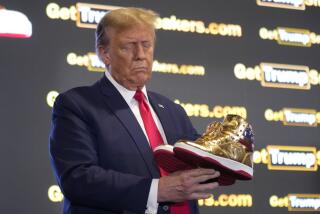COLUMN LEFT : Our Sainted Free Market Ran Amok : S & Ls: Public debate is needed on where to let blind forces have play and where not.
- Share via
Free-enterprisers here at home gloat over the failures of socialism in Eastern Europe and the Soviet Union, and President Bush has just offered the services of American experts to help the Soviet Union create a free-market economy. Included in the offer is technical advice on how to set up a private banking system. As if ours were not in a state of crisis.
The savings-and-loan crisis will cost the American taxpayer at least $200 billion in the next 10 years. This corporate welfare program was brought to us by the conservative philosophy that many Americans want to export: An individual should have the freedom to maximize profits unfettered by state regulation. The free-marketeers’ argument, in the early ‘80s, was: Gut the regulatory system, because that will energize the free market and fatten the Treasury without cost to the taxpayer.
It didn’t work that way, and now the hunt is on for the culprits--government officials, members of Congress, bank directors and investors--including the President’s son. Hardly anyone is asking the key question: When are market principles bad for the economy and bad for democracy?
A memo from Charles Keating’s American Continental, the parent corporation of Lincoln S&L;, advised its bond salesmen: “Remember, the weak, meek and ignorant are always good targets.” Two-hundred million dollars of now-worthless bonds were sold investors, most of them elderly, many of whom put their life savings into Keating’s hands assuming the bonds were insured.
This violates common notions of decency and justice--but what market principles did Keating violate? Suppose the memo had been rephrased: “Let’s target our advertising to those over 65 in the lower-middle income tax brackets with a high school education or less.” That might just sound like good business.
Granted: Keating used S&L; funds for high-risk ventures in hotels, real estate, junk bonds, stocks and a casino--investments that lost millions. Maybe that sounds like bad business, but bad business is part of the “free” market, too.
Or take the case of Neil Bush. As a director of Silverado Bank, he voted to approve loans to two close business associates. What is so bad about that? Maybe they weren’t good risks, but that’s his call as a director. Maybe the bank made a bad choice in making him director, but the officers knew about his business partners, and they took his advice anyway.
Why not just chalk up the S&L; debacle to the market freedom that individuals have to risk their money and make a profit--or take a loss?
Simple. Banking is not purely a business. Allowing free reign of the market could destroy the banking system and more. The regulations that insure deposits were instituted after the Crash of 1929 because the banking system--and thus the whole economy--could not work if people did not have the confidence to put their savings in banks. Other regulations require that bank directors disqualify themselves from votes about loans to their associates and prohibit loans exceeding 5% of the bank’s assets. The Federal Deposit Insurance Corporation has watchdog examiners that are supposed to to prevent unsound business practices that might require a bailout.
Such regulations make sense. We can’t allow market principles to rule in situations that are destructive.
But just what does destructive mean--damaging to the banking system, prejudicial to the stock market, injurious to the environment, harmful to the poor?
In a democracy, it’s the citizens and not the market that should make these political decisions and enforce them.
This is exactly where our political system has failed. For one thing, the free-market rhetoric of the Reagan years made both Democrats and Republicans reluctant to back “regulation.” Existing regulations were hamstrung by members of Congress in both parties that took contributions from S&Ls; and defended their interests.
The problem goes deeper. Taking money from PACs, special interests and the wealthy corrodes the democratic principle of one person, one vote. Yet such practices have become the norm in American politics; some say that they’re essential in the era of expensive TV-oriented campaigns.
We may have much to teach the former communist nations about capitalist democracy, but we’ve got some big changes to make if we want to give them something to emulate. A good start would be to reform campaign financing to keep the market out of democracy.
Maybe the best advice we can offer other countries is this: Encourage public debate and democratic decisions about where to permit the free market and where to limit it. And then give them a hand, whether we like what they choose or not.
More to Read
Inside the business of entertainment
The Wide Shot brings you news, analysis and insights on everything from streaming wars to production — and what it all means for the future.
You may occasionally receive promotional content from the Los Angeles Times.










